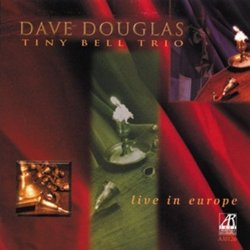| All Artists: Dave Douglas, Tiny Bell Trio Title: Live in Europe Members Wishing: 0 Total Copies: 0 Label: Arabesque Recordings Original Release Date: 4/22/1997 Release Date: 4/22/1997 Album Type: Import, Live Genres: International Music, Jazz, Special Interest, Pop Styles: Avant Garde & Free Jazz, Modern Postbebop, Bebop Number of Discs: 1 SwapaCD Credits: 1 UPC: 026724012624 |
Search - Dave Douglas, Tiny Bell Trio :: Live in Europe
 | Dave Douglas, Tiny Bell Trio Live in Europe Genres: International Music, Jazz, Special Interest, Pop
|
Larger Image |
CD Details |
CD ReviewsA true gem ptitchitza | Leiden, Netherlands | 03/22/2002 (5 out of 5 stars) "One of my favorite bands and some of my all-time favorite musicians recorded their (west) European concerts in October 1996 and released a selection of their songs on this CD. As a Croat, I wonder how would their concerts sound in the countries of the former Yugoslavia in whose music Dave Douglas often found inspiration for the songs of the trio. Unlike the concerts I have seen, these are not as "loud" (the mood is often pensive) but are equally refined. The musicianship, imagination, attention and interplay Dave Douglas (t), Brad Shepik (g) and Jim Black (d, perc.) constantly show is simply awesome. This CD grabs my undivided attention every time I listen to it. It is exciting to hear how some frase played during improvisation triggers an idea and how the other two musicians instantly react in pursuing the path chosen among the many available. Spacious arrangements reflect how much they respect, admire and know each other.Tiny Bell Trio was one of the two bands (the other was a Dutch piano player, Michiel Borstlap) that deeply impressed my father during our recent 20-hour drive. He is a piano player himself and even though his taste in music is closer to mainstream he could not stop praising these guys.Even though Brad Shepik plays with a number of different bands (Paradox Trio, Pachora, the Commuters, Babkas, etc...) -- and is a band leader in some of them -- the Tiny Bell Trio remains the band in which this extraordinary guitarist, I feel, best displays his great talent.I highly recommend studio recordings of the band, especially the first CD (Tiny Bell Trio, Songline Recordings 1994) and the second one (Constellations,Hat Art 1995 -- Amazon lists this CD under Dave Douglas)." Excellent Live performances ptitchitza | 06/14/2000 (5 out of 5 stars) "Douglas' Tiny Bell trio stretch out on many of these tunes, Song for... and Czardas really shine.Tiny Bell's music seems to ramble when you first hear it, this may be due to some eastern European effects they employ and an "uncentered" feel when Shepik isn't playing chords. The more you listen to these pieces, you understand the how much these improvisations make sense."
|

 Track Listings (9) - Disc #1
Track Listings (9) - Disc #1